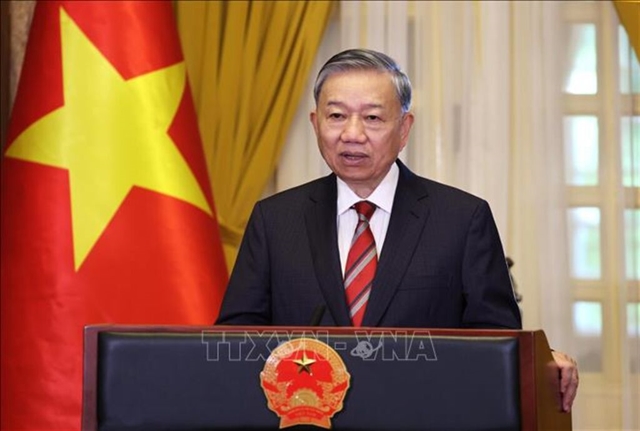 Politics & Law
Politics & Law


|
| Party General Secretary Tô Lâm. — VNA/VNS Photo |
HÀ NỘI — One of priorities to realise the aspirations of the nation's rise is to continue improving institutions and laws to fully unleash productive capacity, mobilise all resources, harness all potentials and strengths of the country, and seize every development opportunity.
This was the message from Party General Secretary Tô Lâm in his article titled 'Institutional and legal breakthroughs for era of the nation’s rise' released on Sunday.
He said that Việt Nam has developed a relatively consistent, transparent and accessible legal system that fundamentally governs all areas of social life.
This includes key constitutional documents as well as major laws and codes in the fields of civil, business, commercial, administrative, criminal, procedural law, dispute resolution and approximately 300 other laws and codes currently in effect.
The legal framework provides the foundation for socio-economic development, ensures national defence and security and supports international integration.
It can be affirmed that over the past 80 years, since the establishment of the workers' and peasants' state, under the leadership of the Party, our nation has achieved independence, unification, freedom, democracy, peace, stability and development because we have had a Constitution and have successfully implemented it along with other laws, he wrote.
Alongside the implementation of the organisational streamlining revolution and the pursuit of 'double-digit' economic growth, law-making and law enforcement must undergo fundamental reform.
He said the Politburo’s Resolution No. 66-NQ/TW on renewing law-making and law enforcement to meet the demands of national development in the new era sets a target that by 2030, Việt Nam will have a legal system that is democratic, equitable, consistent, unified, transparent, feasible and supported by a disciplined and coherent implementation mechanism.
This legal foundation will ensure the stable, continuous and efficient operation of Government agencies following administrative restructuring, resolve practical legal bottlenecks, pave the way for development-oriented governance and mobilise all citizens and businesses to engage in socio-economic development.
It looks towards the goal that by 2030, Việt Nam will become a developing country with modern industry and upper-middle income.
According to the resolution, by 2025, the key legal 'bottlenecks' will be essentially resolved.
By 2027, legal revisions, supplements and new enactments will be completed to ensure a coherent legal foundation for the State apparatus operating under a three-tier Government model.
By 2028, the legal framework for investment and business will be completed, helping Việt Nam's investment environment rank among the top three in ASEAN.
By 2045, Việt Nam will have a high-quality, modern legal system aligned with advanced international standards and suitable to national realities – one that is strictly, consistently enforced and effectively protects human rights and civil rights.
The rule of law and constitutional supremacy will become a shared norm of conduct in society. National governance will be modern, with a streamlined, efficient and effective State apparatus.
According to Resolution No. 66-NQ/TW, the reform of law-making and law enforcement in the coming period must adhere closely to five guiding viewpoints. Among these, the foremost principle is to "ensure the comprehensive and direct leadership of the Party in the law-making process, and to strengthen the Party’s leadership over law enforcement".
To bring Resolution No. 66-NQ/TW to life and deliver practical results, the entire Party, people and armed forces must thoroughly grasp and effectively implement the tasks and solutions outlined in the Resolution, he said, pointing out five orientations.
First, it is imperative to ensure the comprehensive and direct leadership of the Party in the law-making process, and to fully promote the Party’s role in both the formulation and implementation of laws.
Party committees at all levels must exercise comprehensive and direct leadership in institutionalising the Party’s guidelines and policies into legal provisions, while also strengthening inspection and supervision of this process.
Every cadre and Party member must set an example, take the lead in abiding by and upholding the law, and help spread the spirit of constitutional and legal supremacy.
Second, there must be a renewal of thinking and orientation in law-making – ensuring that legal development both meets the requirements of state governance and, at the same time, encourages innovation, fully unleashes productive capacity and unlocks all resources for development.
Third, he ordered to create breakthroughs in law enforcement and promote the spirit of serving the people, fostering a development-oriented mindset and acting for the common good of the team of officials, civil servants, and public employees.
Priority must be given to ensuring the effectiveness of law enforcement to drive socio-economic development, science and technology, innovation, digital transformation and other important areas of social life.
Fourth, he highlighted the importance of enhancing the effectiveness of international cooperation and international law.
Vietnamese agencies and organisations must strengthen capacity to fully fulfill international legal obligations, effectively participate in the development of international institutions and laws and shape the international legal order.
He also called on developing strategies to increase the presence of Vietnamese experts in international legal organisations and international judicial bodies.
Finally, the Party chief urged for breakthrough solutions to improve the quality of legal human resources as well as digital transformation, artificial intelligence, big data, along with special financial mechanisms for law-making and law enforcement. — VNS




